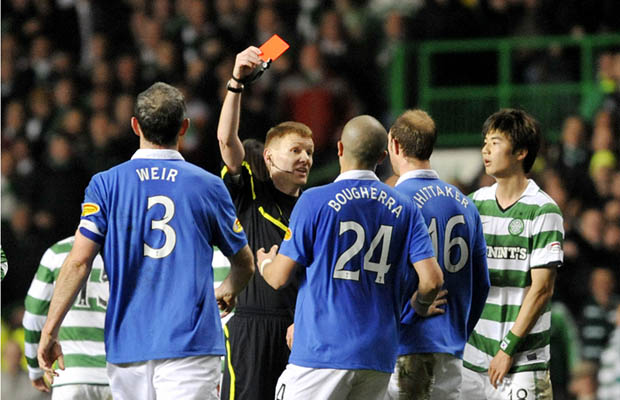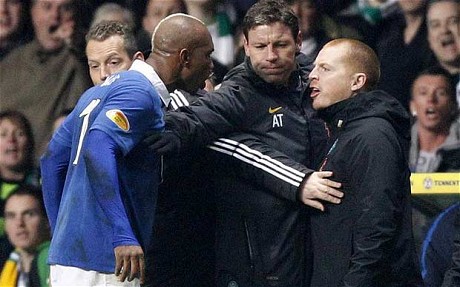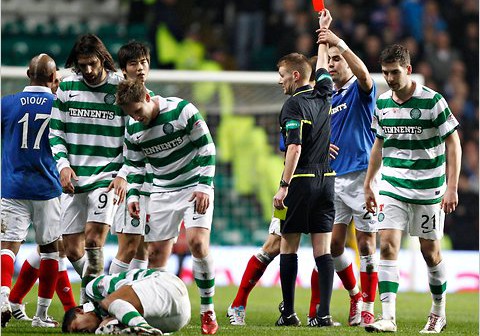“Without guidance and clarity on what constitutes an offense this bill represents a large threat to freedom of speech and freedom of expression.”
 The shock waves from the “Shame Game” on 2 March 2011 still reverberate through Scottish society. Now, with a new law about to be passed by the Parliament, Tony McCann examined the impact of acting rashly and taking action for the sake of being seen to act in CQN Magazine in 2012. Interesting to look back on this given how badly it has gone for the law makers…
The shock waves from the “Shame Game” on 2 March 2011 still reverberate through Scottish society. Now, with a new law about to be passed by the Parliament, Tony McCann examined the impact of acting rashly and taking action for the sake of being seen to act in CQN Magazine in 2012. Interesting to look back on this given how badly it has gone for the law makers…
We’ve all been in arguments. Things get heated; sometimes matters can escalate and erupt into violence or plateau at an uncomfortable shouting match with rage eventually trickling where once it gushed thus unable to sustain the combustion required for further quarrelling. However disputes end there is the period immediately after in which any ideas, suggestions or notions one comes up with are best discarded or at least held back for consideration; the prudent solution is usually not to act whilst the dust has yet to settle. Professor Jennifer Lerner of Harvard Kennedy School has, in lab tests proven the deleterious effects of anger upon risk perception. Anyone with young children will back up Professor Lerner’s research with empirical fact from the kitchen floor or any other tantrum ready area; anger does not make you reasonable.
After the events at Celtic Park on Wednesday March 2nd 2011 culminating in the touch line tussle between Ally McCoist and Neil Lennon a lot of anger seemed to be unleashed. The Daily Mail encapsulated the zeitgeist with “the Old Firm was off the leash again, foaming at the mouth and, the constabulary fear, not for the last time”. From the smouldering remains of that match Alex Salmond came barrelling forth, riding the wave of outrage and vitriol about the what happened making sure he was being seen to “excise and drive out this blight from the game of football in this country”
It is a politician’s lot to make the most of the opportunities that raise their heads, however ugly. It is also the lot of an elected leader to exercise judgment and temper the mob as opposed to pander to it. The dust had barely settled before news reached us that policy was to be whisked in to clamp down on the scourge of sectarianism.
I found the political discourse like listening to 11 year old boys talking about sex, filling in the slots where details and facts go with suppositions and suggestions hinting at something but not quite filling the slots the way the truth would. Whilst the tide of vented spleen fluid was still high Roseanna Cunningham sought to justify her existence by not ruling out fans being prosecuted for singing the national anthem or Rule Britannia or making the sing of the cross if it was intended to be inflammatory. This clumsy dialogue only served to compound how hopelessly out of touch with the situation those in power are. The valiant Alex Salmond charged in on his trusty steed determined to slay a dragon even though he didn’t know what it looked like or where its lair was. For all his bluster and fervour in the wake of the “shame game” and the tempering appeals from both sides of the old firm chasm since that has led to the anti-sectarianism bill being halted, albeit briefly, it is easy to remain unsatisfied that Alex Salmond has truly grasped just how far reaching the ripples caused by his anti-sectarianism bill will be when it hits the water. Any bill designed to diminish what are now intrinsic human rights that were fought for in the first place has to be challenged.
Sectarianism is, according to Wikipedia, “bigotry, discrimination or hatred arising from attaching importance to perceived differences between subdivisions within a group, such as between different denominations of a religion or factions of a political movement”. At no point in the fallout from the “shame game” has anyone sought to publically define what sectarianism is.
Having read the proposed bill (http://www.scottish.parliament.uk/s4/bills/01-offbehfoot/b1s4-introd.pdf) I am left in no doubt that the problem at large is poorly understood and the full might of the law will come down on any errant offender. How can one “tackle sectarianism by preventing offensive and threatening behaviour”? How does one measure offense or threat? Is there a chart with universally recognised & acknowledged values on it corresponding to levels of abuse and threat? I am certain there is not. A handshake could be construed as threatening to an Anthropophobe, Mary Whitehouse found sex & swearing when broadcast offensive yet I do not.
I think by now the scale of the dilemmas thrown up by this bill rushed in through the slowly settling dust of the “shame game” aftermath is becoming apparent. Without guidance and clarity on what constitutes an offense this bill represents a large threat to freedom of speech and freedom of expression. Caution indeed must be taken with any document circulated that has public support from someone that would see fit to deem Rule Britannia or making the sign of the cross a punishable sectarian act.
Under such fast and loose interpretations of sectarianism it is not inconceivable that any action taken by a political party that disadvantages another is indeed a sectarian act; political sectarianism is one of the prominent balustrades of SNP policy and ethos. No one can deny the primary goal of the SNP is to achieve an independent Scotland and as such they will direct resource to this goal that no other party would. If this is not sectarianism in action then I am just as lost as our policy makers are on what indeed constitutes sectarianism.
When we sit, far from the fallout from that heady night in March at Celtic Park, it becomes clear that a number of things do not add up. Offense is indeed a relative term as is threat. Without universally agreed quantification of either of these how can one enforce a law that’s raison d’être is to outlaw and banish the blight of sectarianism when we have no clear consensus on how this blight manifests itself.
We could fumble on and throw all associated behaviours, elements of a diverse community that have nothing directly to do with football. At no point have the authors of this ill conceived anti-sectarianism bill thrown any weight behind championing programs to mitigate friction caused by perception of differences that exist in our community; it is akin to treating obesity with one brisk walk. Exercise is indeed required but that ain’t the whole picture. The treatment for the ills of sectarianism is no different; one swift dose of something with a passing resemblance to a cure is never going to work.
Hearing “ooh ahh up the ra” makes my skin crawl. It has since I was young when back in the 80’s people died in explosions. It does not take a genius to figure out why there are those who turn their back on Glasgow; not everyone has the stomach for what is served here.
Some of us though, believe in our institutions and believe, as Celtic’s founding fathers did, that their institution should be open and free to all without fear of persecution or harm. Irrelevant of how or why a club was founded or what the core beliefs at the heart of that institution were, these are features that can be changed, mellowed or sharpened to suit the progressive tastes of the time. There are many of us for who, irrelevant of our religious beliefs, wade through the bile and negativity because we believe in something better.
If Mr. Salmond and those responsible for our impending anti-sectarian bill, that has the potential to castrate our public opinions and impinge upon one of the most sacred of rights in the western world, were truly serious about tackling the cancerous issues growing in our community then perhaps they would consult those who potentially have the most to lose should these short sighted proposals become law.
When the dust settles after an argument an enlightened and informed dialogue with the involved parties is always the best thing.
* From CQN Magazine, Issue 3, 2012.

